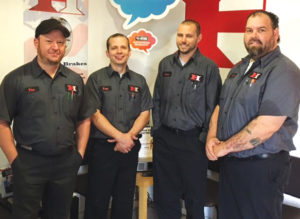 With most of us keeping our vehicles for longer periods and higher mileages, engine performance will slowly decline, so good preventive maintenance is important.
With most of us keeping our vehicles for longer periods and higher mileages, engine performance will slowly decline, so good preventive maintenance is important.
Proper preventive maintenance not only will maintain your engine’s peak performance, but also will lessen the likelihood of an emissions system failure.
It all starts with the fuel you choose to use in your vehicle. Always follow the manufacturer’s recommendation for octane level. More importantly, use a fuel containing the proper cleaning additives to help keep the amount of carbon buildup in your engine to a minimum.
Look for those fuels that are Top Tier compliant. There usually will be a sticker right on the pump to let you know it is Top Tier fuel. All fuels will leave carbon residue behind, but the Top Tier products will reduce the interval for extensive cleanings.
Have your fuel system cleaned thoroughly every 30,000 miles by a professional shop. This cleaning should include your throttle body, the injectors and a decarb service for the intake, valves and pistons. When your engine burns the fuel, it leaves carbon deposits throughout the engine. When these deposits go unattended, the result is poor fuel mileage, poor performance and sometimes emission test failures.
Tuning up your engine at recommended intervals also is vital to performance. Worn spark plugs and other ignition components will weaken the ability of your engine to burn the fuel efficiently. Most vehicles use iridium spark plugs, which last 100,000 miles.
There still are some cars, however, with copper plugs, which need to be replaced at 30,000 miles. It is recommended to replace the ignition wires when spark plugs are replaced. Poor conductivity of the wires also will rob power from your engine. Always replace spark plugs with the brand and type recommended. All spark plugs are not created equal.
The final item causing your performance to decline is your engine compression. Compression is the force created by the piston as it travels toward the cylinder head. Over time, carbon buildup and wear on the cylinder walls will reduce the compression and weaken your engine. Regular oil change services are critical to help reduce the wear. The fuel system decarb service will correct the carbon buildup on top of the pistons.
The last step is cleaning the oil system and correcting the damage to the cylinder walls. This is accomplished by using an oil system cleaner before the oil is changed and then adding a system protectant, which will correct the cylinder wall wear. The cleaner will remove carbon from the piston rings and remove sludge buildup, which has occurred over time. The protectant will smooth the cylinder walls and help the rings seal against them. It is recommended performing these services every 15,000 miles.
For more information, call H and I Automotive at (480) 985-9279. We are a full service professional automotive service center, serving our East Valley neighbors since 2009. Find us online at www.handiautomotive.com or on Facebook and Google+.

